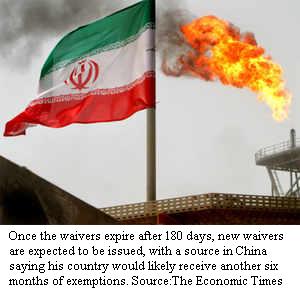|
||||||||
|
|
|
2018-11-17 ArtNo.46453
◆Shape of sanctions: on U.S. waiver on Chabahar port
 【New Delhi】The U.S. administration’s decision to grant India and seven other countries waivers on the sanctions it re-imposed on Iran provides some temporary relief to India. While the details of the waivers are yet to be released, the Trump administration has agreed to waive sanctions on the purchase of oil from Iran for about six months, which would help the Modi government tide over until the general elections, without any major oil price shocks. The waivers announced cover Indian investment in Iran’s Chabahar port and the plan to build a railway line from Chabahar to Afghanistan to facilitate trade. The waivers are welcome also as they indicate that despite all the harsh rhetoric on “choking Iran”, the U.S. may have had a rethink on its sanctions, and the costs incurred in pushing around allies and partners such as India, Japan and South Korea to “zero out” oil purchases. This conclusion stems from the fact that both India and China, Iran’s two biggest oil importers, have been extended waivers. This flexibility could be a sign that the U.S. is leaving space for leeway in resuming talks with Iran in the long term. However, the fact that the waivers are temporary, and contingent on further reductions in oil trade with Iran, means that for now India will need to continue to find alternatives to its offtake from Iran. The alternative rupee-rial mechanism, which was operationalised in 2012 during the last round of sanctions, depends on increasing Iranian demand for Indian goods to balance India’s annual purchases of about $10 billion, which hasn’t fructified yet. The European Union, Russia and China have also been working on a “special payment mechanism” to circumvent sanctions. But they have yet to launch it, limiting India’s options. Moreover, despite the waivers from the U.S., India will still face the impact of the U.S. sanctions, both on oil and on its investment in Chabahar, as very few international companies may be willing to undertake contracts. Above all, by seeking the waivers, instead of sticking to its earlier line that it accepted only UN and not “unilateral” sanctions, India has lost its moral leverage. Unlike China, it chose to reduce its oil intake from Iran, and entered into negotiations for alternative fuel supplies from Iran’s rivals in the Gulf. This could, in turn, impact Delhi-Tehran ties in the long run. Meanwhile, India will have to keep engaging the U.S. in order to secure further waivers, both in this case and for CAATSA-related U.S. sanctions on Iran, Russia and North Korea. As a result, by securing the waiver the government has not exactly dodged the figurative bullet, but merely outpaced it. It will need to keep outrunning that bullet for the foreseeable future. 【News source】 Shape of sanctions: on U.S. waiver on Chabahar port The knowns and unknowns of U.S. Iran oil sanction waivers Letter to BS: India should not succumb to Donald Trump's pressure ○One world: The aim of SEAnews ◆Recruitment of Ad-SEAnews CanvassersYour Comments / UnsubscribeSEAnews TwitterSEAnews MessengerSEAnewsFacebookSEAnewsGoogleSEAnews eBookstoreSEAnews eBookstore(GoogleJ)SEAnews world circulation |
|
[Your Comments / Unsubscribe]/[您的意见/退订]/[ご意見/配信停止]
Please do not directly reply to the e-mail address which is used for delivering the newsletter. 请别用递送新闻的邮件地址而直接回信。 メールをお届けした送信専用アドレスには返信しないで下さい。 |